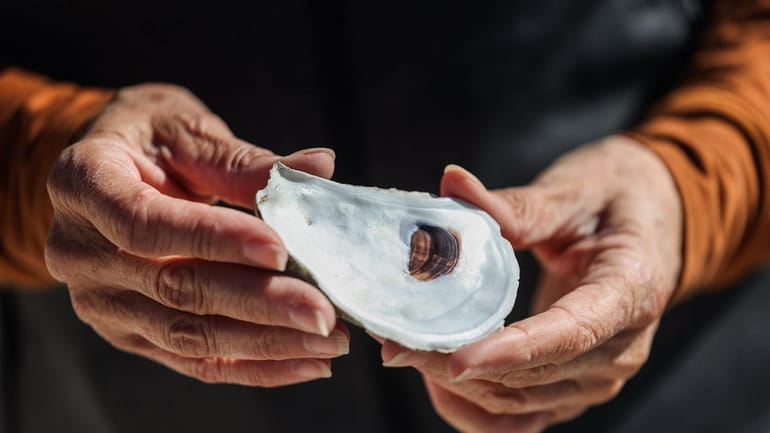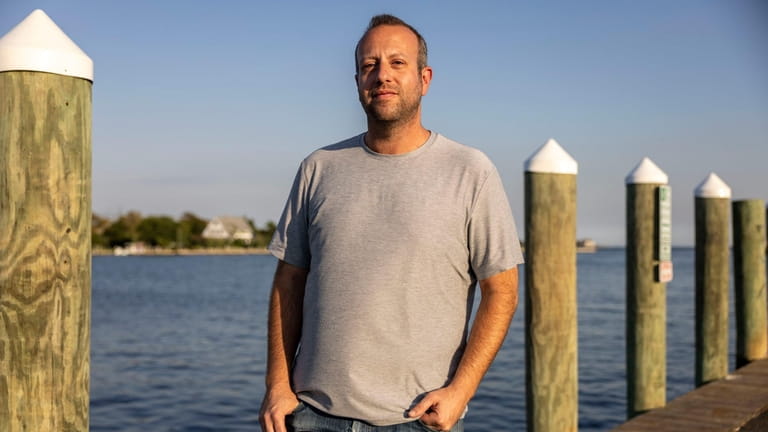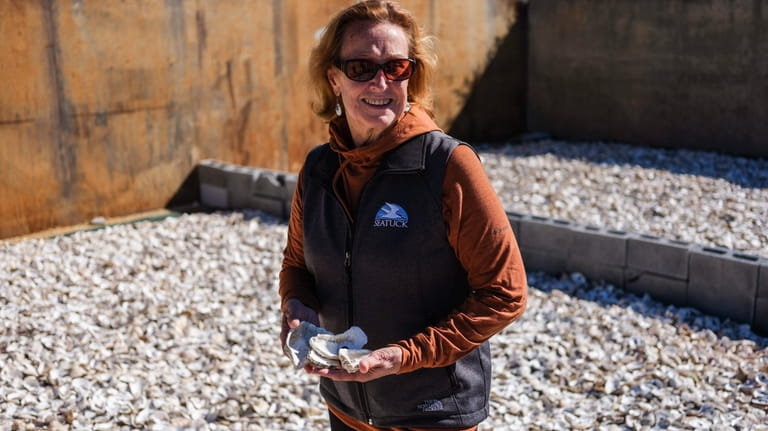Fire Island restaurants join shell recovery program to rebuild marine habitats

Discarded oyster shells are used to help grow young oysters and to build reefs in local waters. Credit: Newsday/Steve Pfost
Ocean Beach restaurant owners say they’ve collected thousands of oyster shells this summer for a program that will use them to rebuild local marine habitats and the Long Island oyster population.
Six of the seven participating businesses joined for the first time this summer, making Ocean Beach the first Fire Island village to participate in Half Shells for Habitat, an oyster shell recovery program run by the nonprofit Seatuck Environmental Association since 2018.

Jon Randazzo, who owns several Ocean Beach eateries including Castaway Bar and Grill, was the first to join the Half Shells for Habitat program last summer. Credit: Newsday/Alejandra Villa Loarca
“I guess it was a little bit of an experiment, not only for them, but for us. Fire Island sometimes can be a little bit difficult because of transportation and logistics,” said restaurant owner Jon Randazzo.
Randazzo, who owns several Ocean Beach eateries, was the first from the village to join the program last year with Castaway Bar and Grill, which recently closed for the winter. He said the restaurant typically goes through thousands of oyster shells in a week, all of which now go to Half Shells for Habitat instead of the waste bin.
The shells are used to help grow young oysters and to build reefs in local waters that offer a natural habitat for other aquatic animals, such as small fish and crabs, said Seatuck water quality scientist Maureen Dunn, who runs Half Shells for Habitat.
“We have a long history of oysters on Long Island, and yet, there are no wild oysters,” she said. “[Cultivated oysters are] the same species, but they serve different purposes. Wild oysters actually contribute back to the environment in that they’re consumed by wildlife, the shells stay in the water, and they grow for a longer time.”

Maureen Dunn, Seatuck water quality scientist, at Islip's recycling facility in Bohemia on Friday. Credit: Newsday/Steve Pfost
Dunn said recycling the shells also benefits the ecosystem such as regulating nitrogen pollution, stabilizing shorelines and mitigating ocean acidification.
Seatuck, which works to conserve Long Island wildlife and the environment, since 2018 has collected nearly 200,000 oyster shells at dozens of restaurants participating in the program across Long Island, and prepared the shells for distribution to oyster restoration programs, such as The Shinnecock Bay Restoration Program run by Stony Brook University.
Camille Guigliano, co-chair of the Village of Ocean Beach Environmental Commission, helped organize logistics for Ocean Beach restaurants that joined the program, along with Jennifer Moritz, village trustee and owner of Matthew’s Seafood House in Ocean Beach. The pair said between 66 and 132 gallons of shells collected from the seven restaurants were sent to the mainland each week — altogether totaling 5,852 pounds of shells collected from Ocean Beach in 2023.
“The big part of it was getting these barrels to the ferry so they could be brought off-island to a collection point,” Guigliano said.
The efforts at Half Shells for Habitat are largely volunteer-run. In Ocean Beach, which is limited by its location on a barrier island where driving is mostly prohibited, the shells are transported to the mainland once a week via the Fire Island Ferry, which donates services to the program.
Volunteers take the shells from the ferry to town-owned waste facilities where they are spread out in the sun for a year to kill any diseases before returning them to the water, Dunn said.
Guigliano and Mortiz said they reached out to restaurant owners in the village after Randazzo’s success with the program last year. They hope the program will expand to restaurants elsewhere on Fire Island next summer.
Half Shells for Habitat
- Six Ocean Beach businesses joined for the first time this summer Half Shells for Habitat, an oyster shell recovery program run by Seatuck Environmental Association since 2018.
- Half Shells for Habitat operates in the towns of Huntington, East Hampton, North Hempstead, Hempstead and Islip, and is hoping to move into Southampton and Babylon as well, said water quality scientist Margaret Dunn, who runs the program.
- The Bayberry, an American cuisine restaurant in Islip, was among the latest restaurants to join during Oyster Week, which ended Sunday.

